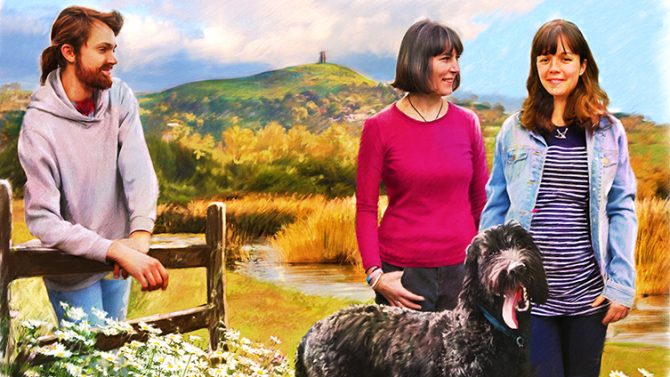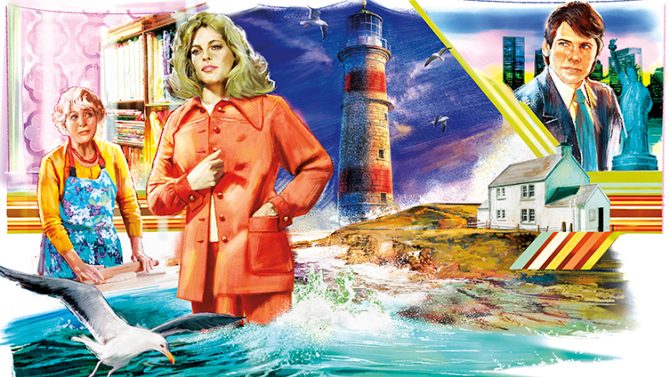There’s Always Tomorrow – Episode 14

There's Always Tomorrow by Mark Neilson
« Previous Post- 1. There’s Always Tomorrow – Episode 01
- 1. There’s Always Tomorrow – Episode 14
Today, Helen was waiting for the knock on her door that would bring Larry with his latest adventure.
The dogs surged through the open door to claim him.
“You’re a dog magnet,” she complained. “Where are we going today?
“What new miracle are you going to produce out of that old backpack?”
“It’s a secret,” he said cheerfully.
“I used to like secrets,” she mourned.
“Then you’ll like this one. At least, I hope so.”
They fed the cats, loaded up the dogs and set off, turning north this time and heading along the country roads towards Stonehaven.
Driving the old van and chatting, Helen wondered what the strange feeling was. Then she recognised, with a start, that she was happy.
It had been a long time since she had felt like this. Three years of grief, guilt and pain had suddenly rolled away.
It was a sobering thought and she was silent for a while, considering it.
She didn’t notice the quick glance her new silence drew.
Larry guided her on to the quiet road that led to Dunottar Castle and told her to park near the gate. This early in the season, they had the place to themselves.
She switched off the engine and turned to him.
“What next?” she asked.
He smiled.
“A story. Almost four hundred years ago, Oliver Cromwell’s army invaded Scotland.
“The Scottish Parliament met in panic and ordered the Earl Marischal to take the Scottish Regalia – the Crown, the Sceptre and the Sword of State – and hold them in Dunottar Castle.
“These were not just valuable trinkets; they were symbols of Scottish nationhood, and they knew that Cromwell would never rest until he had them in his power.
“Dunottar, sitting out into the sea, was near impregnable, built to withstand siege.
“Plus, it was not one of the more famous strongholds where Cromwell would instantly search for the missing Crown Jewels.”
Larry paused.
“Come and see what’s left of the castle.”
“Did it fall?” Helen asked.
“All in good time. Bring the dogs and let’s walk until we see the castle.”
It was an easy path, winding towards the sea.
Gradually, the ruins of the castle emerged over the skyline, stark and sombre against the shining sea and the late winter sun.
“Climb on to this knoll and look down,” Larry urged her. “Look at how the whole castle is spread out.
“Well, there were two flaws in the Scottish Parliament’s plans.
“First, Cromwell found out that the Scottish Crown Jewels had been taken here and ordered his army to storm the place. Their initial attacks bounced off.”
He sighed.
“Second, the castle was built to withstand known techniques of attack, but Cromwell had heavy artillery.”
Larry pointed down to the grass where they stood.
“They positioned their artillery here, and after that it was only a matter of time.
“They reduced the castle to rubble, but the small Scottish garrison fought on.”
From the knoll, the huge castle suddenly seemed defenceless – as it would have been against prolonged heavy gunfire. The gunners couldn’t miss.
“So Cromwell got the Crown Jewels?” Helen asked.
Larry smiled.
“No. That’s why I decided to bring you here. Although they were protected by a garrison of men, it was two brave women who saved the day.”
“How?” Helen asked.
“Female cunning. Warfare back then was a strange and courteous business.
“A ceasefire was called for an hour or so, when the wife of the castle commander was visited by her friend, the wife of the local parish minister.
“Cromwell’s officers were aware that being shelled must have been terrifying to the commander’s wife and arranged this unofficial break in battle.
“The two women hatched out a daring plan between them – without the commander’s knowledge, in case he was tortured when the castle fell.
“The minister’s wife turned up one day with her maid, who was carrying a huge bundle of flax and a spinning distaff.
“The flax and distaff were checked by Cromwell’s troops and the women waved through.”
“And?” Helen asked, caught up in the story.
“The flax and distaff were for spinning linen,” Larry explained. “Perfectly normal and innocent back then, but when the two wives met, there was a mad scramble to hide the Crown Jewels in the bale of flax.
“The distaff was replaced by the Scottish Sceptre. The Sword of State was wrapped inside the flax, which had already been searched, and the Crown of Scotland was against the stomach of the minister’s wife.”
“Oh, how clever!” Helen exclaimed. “Did it work?”
“It nearly didn’t,” Larry admitted. “When the minister’s wife and her maid left, the commander of Cromwell’s troops came forward to help the lady on to her horse.
“If he had felt the crown, all was lost.
“But the man was courteous in his handling of what he assumed was a pregnant lady. He doffed his hat, and bowed them on their way.
“And that’s how the Scottish Crown Jewels were smuggled out from under the nose of the most powerful army in the world.”














